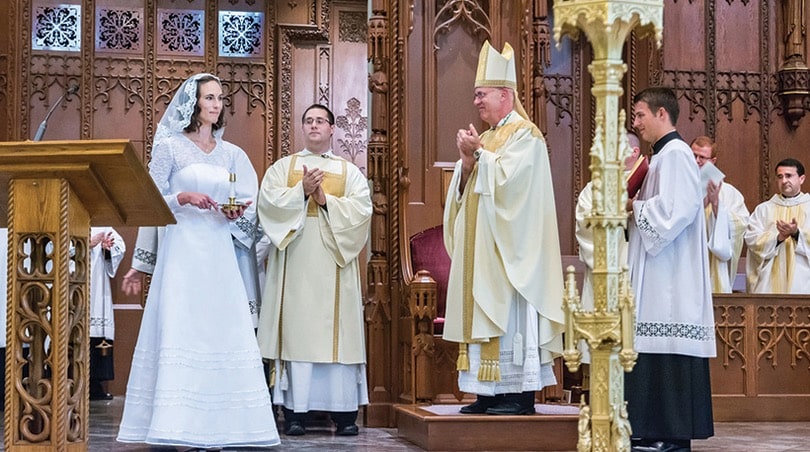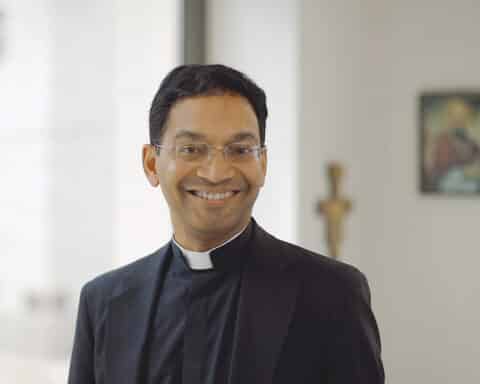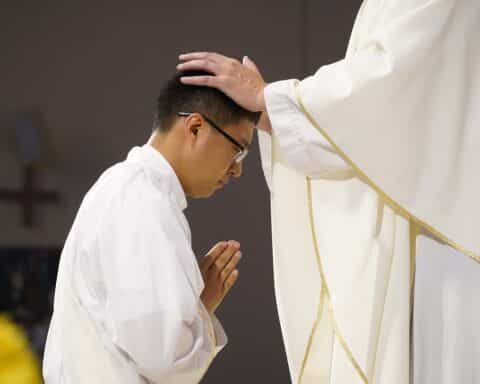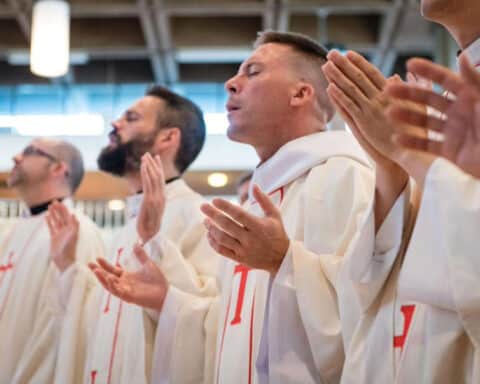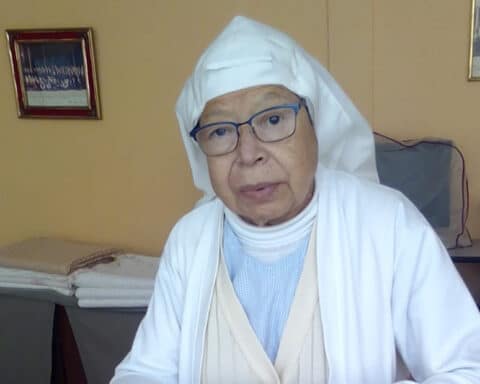Since the fourth century, consecrated virginity has been recognized by the Church as a spousal union between a woman and Christ. The ancient tradition is coming back into focus after Pope Francis approved a new instruction, Ecclesiae Sponsae Imago, on June 8, clarifying the life for modern times.
Some of the wording ruffled feathers, in particular a passage claiming “perfect continence” and the practice “of chastity in an exemplary way” are not “essential prerequisites.”
The U.S. Association of Consecrated Virgins stated their disapproval a few weeks later in July that: “The long-awaited instruction on the Ordo Virginum is deeply disappointing in its denial of integral virginity as the essential and natural foundation of the vocation to consecrated virginity.”
But young consecrated virgins Andrea Polito and Carmen Briceno have focused on the positives of the letter — that it’s bringing new attention and a renewal to a vocation that hasn’t lately had a lot of younger members. The USACV estimates on their website that, as of 2016, there were less than 5,000 consecrated virgins worldwide.
‘A call to something else’
Polito, a nurse living in Denver, said in 2012 she was 26 and living the single life with the expectation of marriage in her future. But then she sensed a call to something else. She’d never heard of consecrated virginity; she assumed the stirrings in her heart meant that God wanted her to enter religious life, which she wasn’t particularly keen on.
“I never in my life, ever, ever, ever desired or thought I’d ever be a nun or consecrated. I was really sold on marriage through my whole childhood,” she told Our Sunday Visitor. “I’m not the type of person who has thought since they were eight years old that they were called to be God’s bride. I was like, ‘No, I’m definitely going to be some hottie’s bride.'”
God had other plans. While watching the Passion of Christ on Good Friday with a group of high schoolers, Polito was struck during a very intense part of the movie. “I was looking at Mary Magdalene and I asked this really weird question (of God) in my mind,” she recalled. “Why of all the people that you healed, did she get to be here at this really important moment in your life and in our salvation history? And the answer was, ‘She gave up everything for me.'”
It was the first time the idea of religious life didn’t scare Polito. “It wasn’t repulsive, it was intriguing,” she said. “This might be right, this might be good. From there, I just started to agree with God to think and pray about it.”
In the world for Christ
Across the country in Manassas, Virginia, Briceno has had a similar experience. Raised Catholic and attending Catholic schools, she’d always assumed she’d get married and have a family someday. Then, with the encouragement of her spiritual director, she decided to go to World Youth Day in Germany. She was expecting to have a good time — maybe even meet her future husband.
But — “I had an encounter with God there. I just kind of felt God telling me, ‘You’ve given so much time and attention to young men, or to your desires for your future, but what about me?'” she reminisced. “‘How about you just allow your dreams and thoughts to rest and let me do something beautiful?’ And that really began a discernment process.”
| Formation Process |
|---|
|
So what does formation look like for a consecrated virgin? It’s a little bit different for everyone. For both Polito and Briceno, their formation time involved a lot of prayer, acts of mercy, discernment with a spiritual director, classes and oversight from their dioceses. The amount of time in discernment varies, but the instructions recommend between anywhere between three and six years. They have a close relationship with the bishop in their diocese, who is their “pastor.” But there are no hard and fast rules on time spent in prayer, the flow of life, the career choices or living situation, etc. It is up to the discernment of the individual woman in tandem with her spiritual director and bishop.
|
Both young women’s paths led them to consecrated virginity — not religious life, as they had originally thought.
For Polito, the discernment of her vocation was a relief. She enjoyed having deep conversations with her coworkers and living in the secular world. She felt she wouldn’t be able to minister to the world in the same way if she lived in a convent.
“While I was praying about being a nun, I was having a really hard time because the conversations I’m having with people at the hospital are really important; they’re not going to be having these conversations with anyone else,” she said.
In turmoil, she sought the advice of a priest friend, who she expected would tell her to get over herself and head to the convent. To her surprise, he asked her to unpack her feelings. She told him she felt called to be in the world but also belong solely to Christ. He told her consecrated virginity could be the answer.
Acknowledge your gifts
Briceno also found that consecrated virginity was the answer in sharing her gifts.
“I could belong fully to God but still be active in the world,” she told OSV. “It isn’t about what you’re doing specifically, it’s about who you belong to.”
Briceno has started her own ministry “Happy Feet” — based on the verse “How beautiful upon the mountains are the feet of those who bring the Good News” (Is 52:7) — and gives talks, leads retreats and creates religious art. Making religious products, like t-shirts or handbags or water bottles, is “another form of evangelization. If you buy a Guadalupe tote that I designed, when you go to your bank or to your gym, there’s a holy sacred image in these places where it’s usually not.”
For young women who may be discerning this life, Briceno recommends, “See how you’re already living your life. When you’re consecrated, you can still maintain your type of life.”
Polito says it’s important for women considering this life to grieve the things they are giving up — like a spouse and children — and not bury those feelings. At the same time, she says one must acknowledge the wonderful gifts received in turn.
“I have to acknowledge this is hard, and not a natural instinct,” she said. “But God calls some of us away from that to live in this amazing supernatural realm of being in a deeper relationship with him.”
Mariann Hughes writes from Florida.

